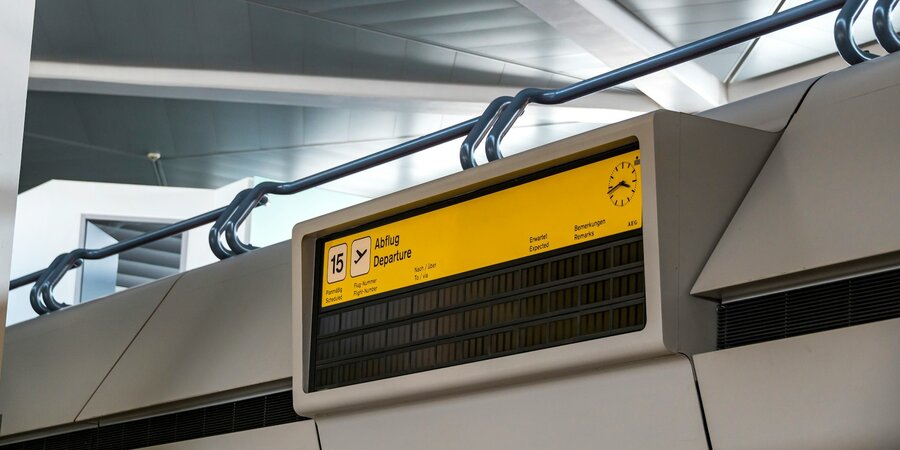Aviation Law
January 25th, 2024
Case C 474/22:
The ECJ case C 474/22 involved a passenger with a confirmed booking on a Laudamotion flight from Düsseldorf, Germany, to Palma de Mallorca, Spain, scheduled for June 26, 2018. Fearing a business meeting delay due to the previously announced flight delay, the passenger decided not to board the Laudamotion flight but to book an alternative flight. With this replacement flight the passenger arrived at the final destination with a delay of three hours and 32 minutes.
Legal Background:
The passenger assigned the claim to a German claim farmer, which filed a lawsuit for a compensation of €250 under Regulation (EC) No 261/2004. The appeal court interpreted the Regulation to that extent that passengers that are informed of a three-hour delay pre-departure have the same rights as passengers on cancelled flights, making them eligible for compensation.
Laudamotion appealed the decision to the German Federal Supreme Court, which, noting the passenger’s failure to appear 45 minutes before the scheduled departure, questioned whether this requirement applied in cases of substantial delays.
The key questions that were referred to the ECJ:
1. Does the compensation claim for a delay exceeding three hours subject to Art. 5, 6, and 7 of Regulation (EC) 261/2004 requires the passenger appearance for check-in at the gate at the time indicated by the airline, or is this requirement exempted in cases of significant delays?
2. If the compensation claim is not automatically exempted for significant delays, does such exemption apply when passengers had sufficient indications of a substantial delay before the scheduled departure?
This was the ECJ’s response:
The ECJ clarified that the case primarily involves the consequences of a delayed departure. The core issue is whether a passenger, to claim compensation for a delay of more than three hours, must have appeared for check-in at the departure gate as per the airline’s instructions.
The ECJ emphasized that passengers, even if online registered, must appear in person on time at the airport to comply with Article 3(2)(a) of Regulation (EC) 261/2004.
The court confirmed that passengers of delayed flights, unlike cancelled flights, must undergo check-in formalities. It was highlighted that the compensation is granted for an irreversible time loss of three hours or more, common to all affected passengers, justifying standardized compensation. However, individual damages, such as missing a business meeting, fall outside the compensation scope but may be subject to further claims under national or international law.
In summary, the ECJ ruled that for compensation claims under Regulation (EC) 261/2004 due to a significant flight delay, passengers must adhere to the check-in requirements, as specified by the airline, even if they have already completed online registration. The court stresses the standardized nature of compensation for time losses. However, individual damages may warrant additional legal claims beyond the scope of Regulation (EC) 261/2004.
Case C 54/23:
In the ECJ matter C 54/23 a passenger booked a flight with Ryanair for October 31, 2019, from Düsseldorf, to Palma de Mallorca and back. The operating carrier, Laudamotion, informed the passenger in advance about a six-hour delay for the outbound flight. In response, the passenger independently booked a replacement flight to attend a business meeting in Palma de Mallorca, eventually reaching the destination with a delay of less than three hours compared to the original schedule. Passenger claimed compensation from Laudamotion under Article 5(1)(c) and Article 7(1) of Regulation (EC) 261/2004, along with seeking information from Ryanair regarding unused taxes.
Legal Background:
Both the lower and appellate courts rejected the passengers’ claims, arguing that Laudamotion was not obliged to provide compensation since the passenger did not use the original flight and reached the destination with a delay of less than three hours. However, German civil law allowed passenger to claim reimbursement for the costs of the replacement flight.
Plaintiff appealed to the German Federal Supreme Court, seeking clarity on the interpretation of Article 3(2)(a), Article 5(1)(c), and Article 7(1) of Regulation No. 261/2004.
The referring court highlighted previous ECJ rulings, indicating that compensation for significant flight delays is generally granted to passengers experiencing a time loss of three hours or more upon reaching their final destination. It questioned whether such compensation would be denied to a passenger who, anticipating a substantial delay, independently booked a replacement flight and reached the destination with less than a three-hour delay compared to the original schedule.
Referring to previous ECJ decisions, the court suggested that a claim for compensation might still be valid if, before the standard check-in time, there were clear indications of a delay exceeding three hours at the final destination. This would relieve the passenger from the obligation to check in at thte airport on time or actually undertake the journey, regardless of the actual arrival time at the destination.
The German Federal Supreme Court, facing uncertainties in the interpretation of the relevant articles, decided to stay the proceedings and seek clarification from the ECJ on two specific questions:
1. Is a compensation claim for a flight delay of at least three hours, under Articles 5, 6, and 7 of Regulation (EC) 261/2004, categorically excluded if the passenger, anticipating a significant delay, uses a replacement flight organised by himself, thereby reaching the final destination with a delay of less than three hours? Alternatively, could such a compensation claim be considered if there are sufficiently confirmed indications, before the standard check-in time, of a delay exceeding three hours at the final destination?
2. In the latter scenario, does the entitlement to compensation for a flight delay of at least three hours, under Articles 5, 6, and 7 of the Regulation (EC) 261/2004, forces the passenger to adhere to the check-in requirement outlined in Article 3(2)(a) of the Regulation (EC) 261/2004?
The ECJ, in response, clarified that under Articles 5(1) and 7(1) of Regulation (EC) 261/2004, a passenger who books a replacement flight due to an anticipated significant delay on the original flight and reaches the final destination with a delay of less than three hours compared to the planned arrival time is not entitled to compensation. The court emphasized that the aim of the regulation is to address „significant inconvenience“ suffered by passengers, and in cases where the passenger reaches the final destination with a delay of less than three hours, such inconvenience cannot be considered „significant“ in the context of the Regulation.
Conclusion:
In conclusion, the ECJ clarified that passengers forfeit their right to compensation under Regulation (EC) 261/2004 if they fail to show up for check-in on time, even if they are aware of a significant flight delay. Additionally, passengers who proactively book alternative flights in anticipation of delays may not be eligible for compensation if the alternative flight results in an arrival delay of less than three hours. Although these decisions may not come as a big surprise, it shows at least that the ECJ is sticking to the general concept of the analogy between severe delays and cancellations: the passenger has to suffer from inconveniences due to the “loss of time” and nothing else. Luckily the ECJ did not invent any new aspects with regard to inconveniences but rather stuck to the time aspect in cases of delayed flights. In so far these decisions add some clarity on the interpretation of the compensation regime under Regulation (EC) 261/2004.
Sources
European Court of Justice, 25.01.2024, file C 474/22
European Court of Justice, 25.01.2024, file C 54/23



